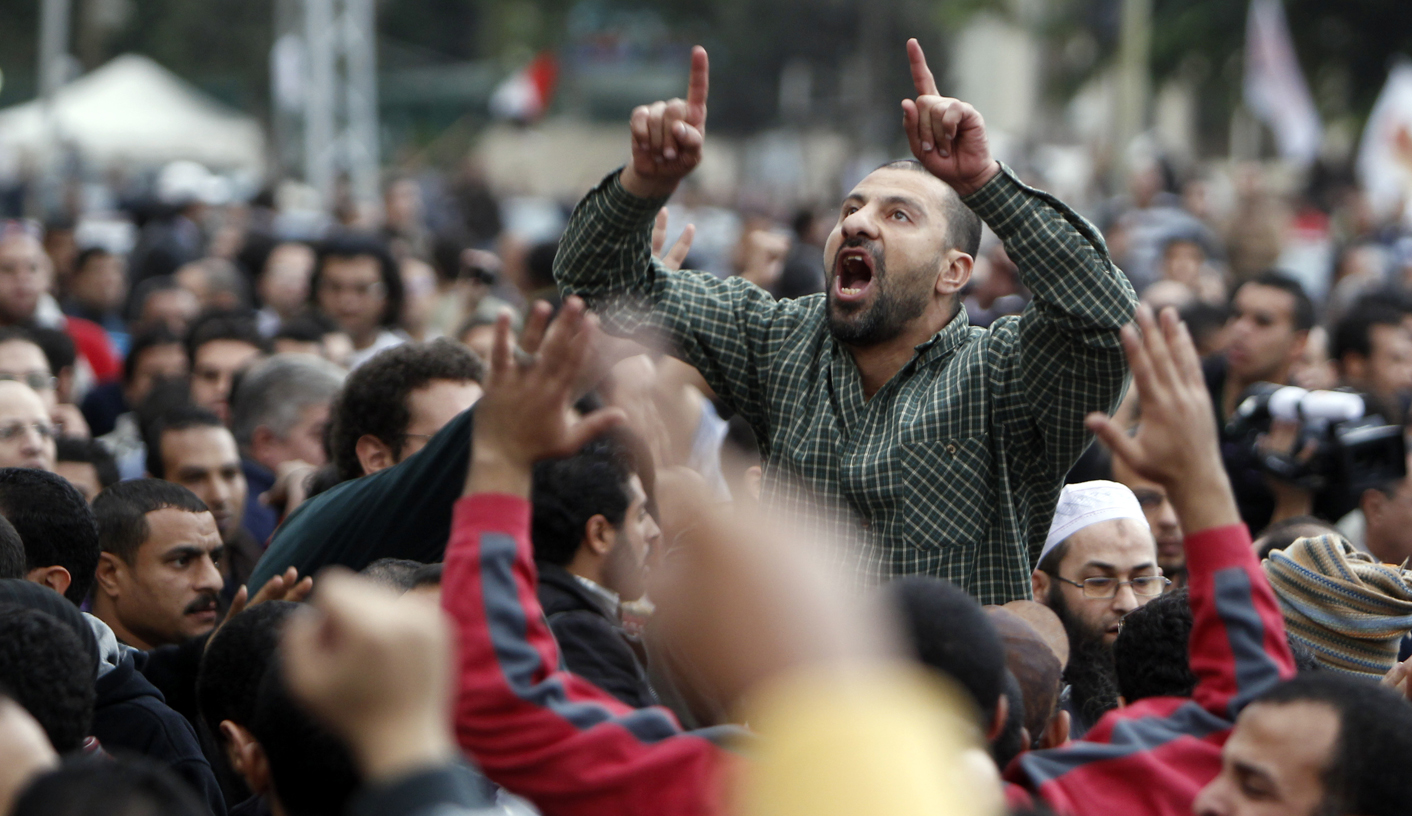By Thursday at least six people were killed and more than 600 injured in clashes between rival political factions outside the presidential palace in Cairo. The fighting erupted late on Wednesday afternoon when thousands of Morsi's supporters descended on an area near the presidential palace where about 300 dissidents had been staging a sit-in. As Muslim Brotherhood supporters and opposition activists clashed, journalists too were targeted.
On Thursday, Reporters Without Borders issued a statement condemning the attacks on journalists in Cairo. “Witnesses say the president’s supporters deliberately targeted and attacked journalists,” Reporters Without Borders said. “We call on President Morsi to order an investigation into the circumstances of these attacks and to punish those responsible. As president, he must ensure the safety of all of his fellow citizens, including journalists.
Al-Hosseiny Abu Deif, a reporter from the Al-Fagr newspaper, was rushed to hospital after being hit in the head by a rubber bullet fired at close range at in the early hours of Thursday morning. He is said to be in a critical condition.
Reporters Without Borders claim witnesses have told them Morsi supporters deliberately targeted Deif in clashes outside the presidential palace in the Heliopolis suburb of Cairo. “Five minutes before he was shot from a distance of just two metres, he showed colleagues photos of the president’s supporters with sophisticated weapons,” Reporters Without Borders said. “His camera was stolen after he was shot, as colleagues went to his aid.”
But Abu Deif was not the only journalist injured in clashes this week. According to Reporters without Borders, so were Mohamed Azouz from the government owned newspaper Al-Gomhuria, Osama Al-Shazly of the Al-Badil daily, Islam Abdel Tawab of Al-Alam Al-Yaw and Sahar Talaat, a correspondent for Radio France Internationale’s Spanish service.
Earlier on Wednesday, two journalists with Turkey’s TRT television, journalist Mehmet Akif Ersoy and cameraman Adil Ahmet, are reported to have been attacked in Tahrir Square and their equipment damaged.
At the heart of these clashes lies Morsi’s announcement last Saturday to put a hastily-completed constitution to a national referendum on December 15. Many Egyptians believe the rush towards the referendum does not allow time for a national debate on about 25 articles that are said to pose a danger to civil liberties.
Journalists believe the new constitution gravely imperils freedom of expression and freedom of worship for religions other than Islam, such as Christianity and Judaism.
Protests against the decree and the referendum have seen violence break out not just in Cairo itself but also in provincial cities such as Suez, Port Said, Ismailiya, Zaqaziq and Alexandria. And as protesters defied an order to vacate the area outside the presidential palace in Cario, the Egyptian military deployed tanks outside the palace.
After a lull in clashes on Thursday morning, violence had picked up again by Thursday afternoon as the opposing sides began throwing stones at each other as the army stood by.
The state news agency said the military deployment on Thursday around the palace was to "secure" the building but Morsi’s opponents believe he will have no qualms about using the military to secure the dominance of the Muslim Brotherhood-aligned Freedom and Justice party.
If anything, the current impasse in Egypt has demonstrated a yawning chasm between the revolution's promises and current political spectacle.
Along with measures on closing newspapers and banning circulation, the detention of journalists symbolized the decline of freedom of the press under Hosni Mubarak and Anwar Sadat. The Tahrir revolution, journalists hoped, would let them criticize the regime, and give them a free press.
And even though the media has enjoyed a greater degree of freedom since Mubarak’s fall, any constitution that arises from the current period of transition, must guarantee these freedoms.
In support of this principle, thousands of Egyptian journalists marched to Tahrir Square on Tuesday in protest against Morsi’s decree and the controversial draft constitution. The journalists decided to boycott the constituent assembly's meetings and even called for a newspaper strike until the draft was amended.
On Tuesday independent and opposition newspapers refused to publish their Tuesday editions in protest against lack of protection for press freedom in the draft constitution.
The independent daily Al-Tahrir said in a message on its website that its decision not to publish was in order to “stand up to tyranny”. It “objects to continued restrictions on media liberties, especially after hundreds of Egyptians gave their lives for freedom.”
Another daily, Al-Masry Al-Youm, said the papers were "protesting against the articles on the press in the draft constitution… and reject Morsi's November 22 decree."
Significantly the decree allows Morsi to place his decisions and those of the Muslim Brotherhood-dominated constituent assembly beyond judicial oversight.
Reporters without Borders has called on the Constituent assembly to amend the draft in order to provide more protection for freedom of expression and information.
Similarly the Council for the Protection of Journalists (CPJ) has also come out in support of journalists opposing the draft constitution. "We support the right of journalists to seek protection under this new constitution," CPJ's Middle East and North Africa Program Coordinator Sherif Mansour said. "We call on President Mohamed Morsi to work with civil society and press freedom groups to craft a constitution that truly guarantees freedom of expression and eliminates restrictions in the current draft."
Like many other Egyptians, journalists feel let down by Morsi. Journalists consider themselves shortchanged even within the organisations that are meant to be fighting for them. Mamdouh Al-Wali, chairperson of the journalism syndicate, who was also appointed by Morsi as chairman of state newspaper Al-Ahram, broke ranks with the rest of the organisation when it came out in favour of the draft constitution.
Wali said he had been assured his reservations against the draft would be addressed.
"They promised me that the constitution's clauses would be changed, that a clause explicitly banning the detention of journalists would be added, and that the supreme media council, whose role is to oversee public information and media activities, would be divided into two parts - a media council and a public information council. Moreover, I was promised that there would be a clause protecting state media against privatisation.” Members of the constituent assembly however say they made no such promises. They only gave an undertaking to express Wali’s reservation to the rest of the assembly.
With political differences spilling out onto the streets as they currently are, it’s clear Egypt is on the brink of significant instability. Egyptians are bracing themselves for a rocky ride and journalists too will have to buckle up. DM
Read more:
- Egypt's fuzzy freedom of the press in Haaretz
- Dictatorship 2.0 - Egyptian edition? In Daily Maverick
Photo: An anti-Mursi protester shouts during a protest against the president outside the presidential palace in Cairo December 5, 2012. Islamists fought protesters outside the Egyptian president's palace on Wednesday, while inside the building his deputy proposed a way to end a crisis over a draft constitution that has split the most populous Arab nation. REUTERS/Mohamed Abd El Ghany





